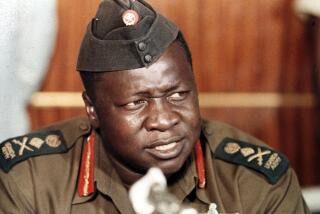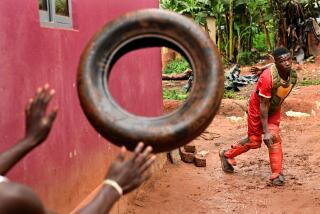Volunteers / Helping hands : In Uganda, Reality Replaces Idealism
- Share via
Erwin Quitoriano Masinsin is readjusting to life in Orange County after two and a half years in Uganda as a Peace Corps volunteer.
“I do miss it, being here in the concrete jungle versus being out there completely in the wild,” the Fullerton resident said. “Every weekend, in order to go to the market, I would cross the equator.”
Masinsin, 25, a mechanical engineer, helped rebuild roads and machinery in the 787,000-acre Queen Elizabeth National Park, part of an effort to boost “ecotourism” in the east Central African nation.
The park, the country’s second-largest, shelters wildlife and about 10,000 Ugandans who live in five villages within its boundaries.
Masinsin traveled to Uganda soon after graduating from the U.S. Merchant Marine Academy at Kings Point, N.Y.
“After I graduated, the next thing I knew it was July and I was going to Uganda, a country I’d never even heard of,” he said. “I was afraid I did not have enough engineering experience to do the job, but I told them I would give it my best shot.”
In a country ravaged by political turmoil under dictator Idi Amin and his successor, Milton Obote, Masinsin said he was surprised by the resiliency of the people he met.
“After going through so much, they still have hope that things are going to be improving,” he said.
“Personal relationships are the most important thing for them because they have hardly any material things. And people come and go very quickly sometimes because of disease. Uganda has a very high rate of AIDS.”
During his Peace Corps stint he had a number of encounters with Africa’s fabled wildlife. Most incidents were peaceful, he said, except for a surprise visit from a hippopotamus while he was swimming in Lake Edward. He had thought the hippos were too far away to notice him.
“Little did I realize that hippos can stay underwater for a great length of time,” he said. “I didn’t know he was there until this big head popped out at me.”
He escaped in a nearby motorboat.
His experience in Africa, he said, was sobering but valuable.
“You come in idealistic, but you quickly become realistic,” he said. “You realize that this is the real world, and the changes you can accomplish sometimes seem very small. But if you look at the overall picture, it’s definitely a worthwhile thing to do.”
More to Read
Sign up for Essential California
The most important California stories and recommendations in your inbox every morning.
You may occasionally receive promotional content from the Los Angeles Times.













